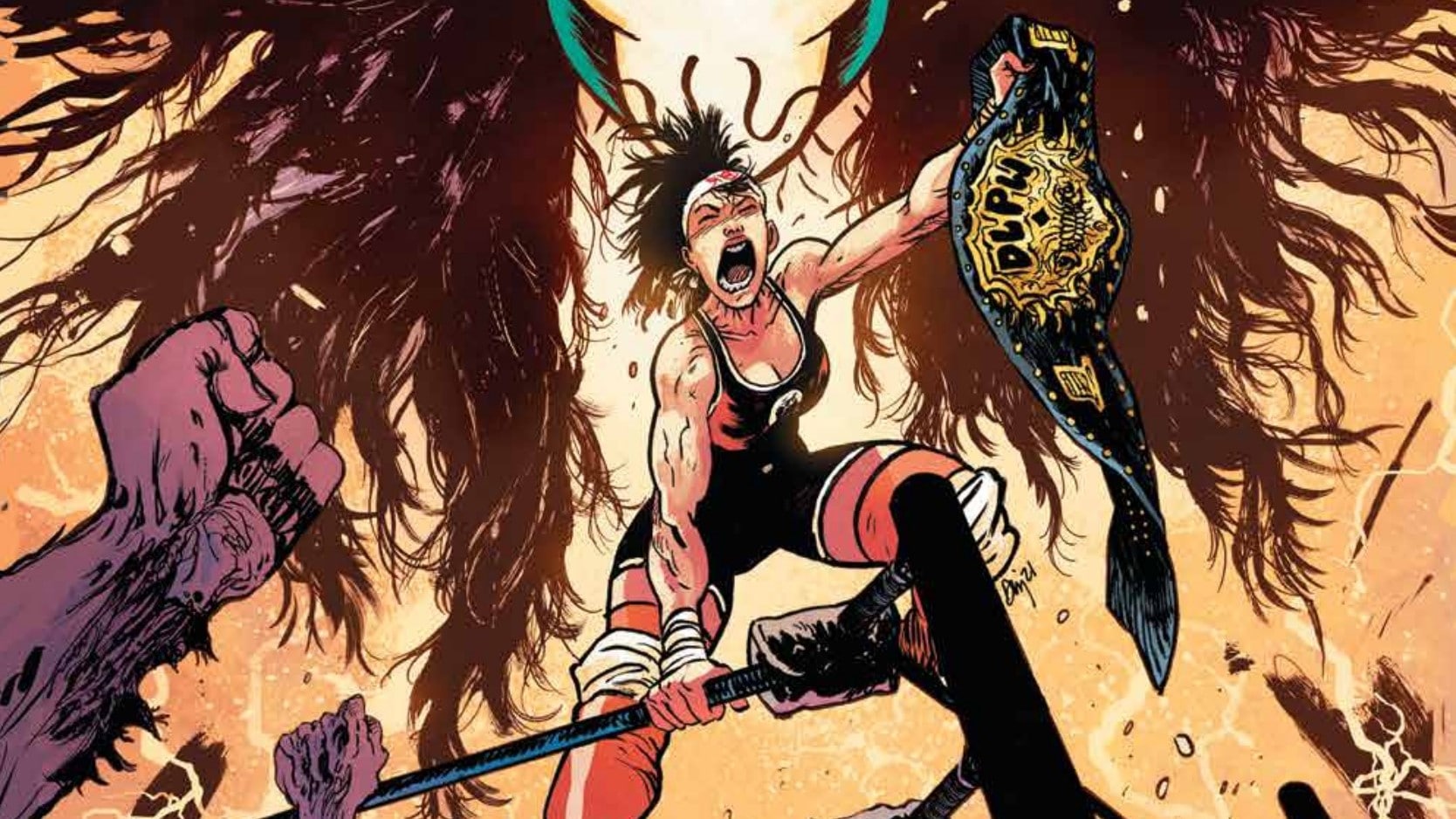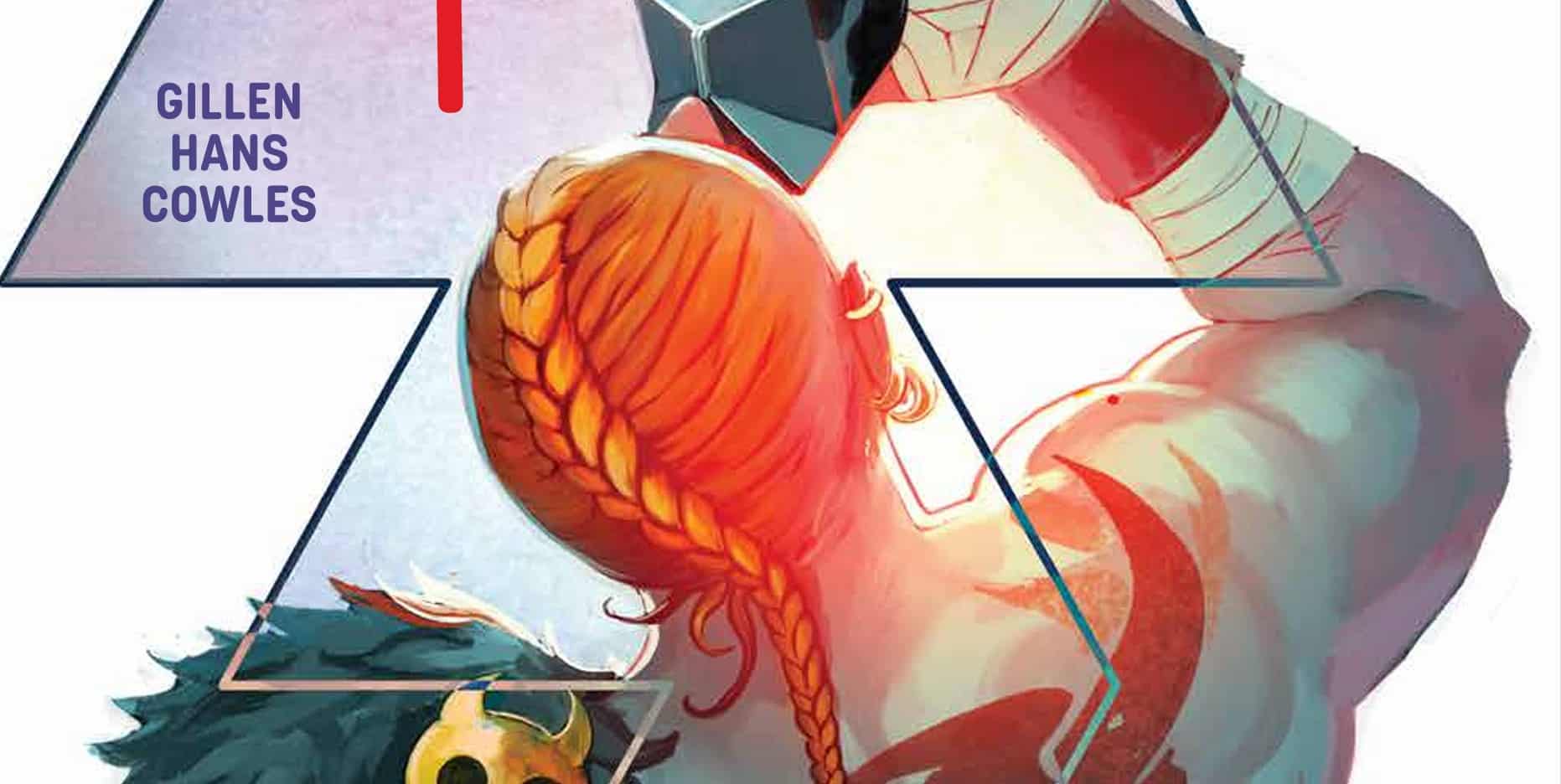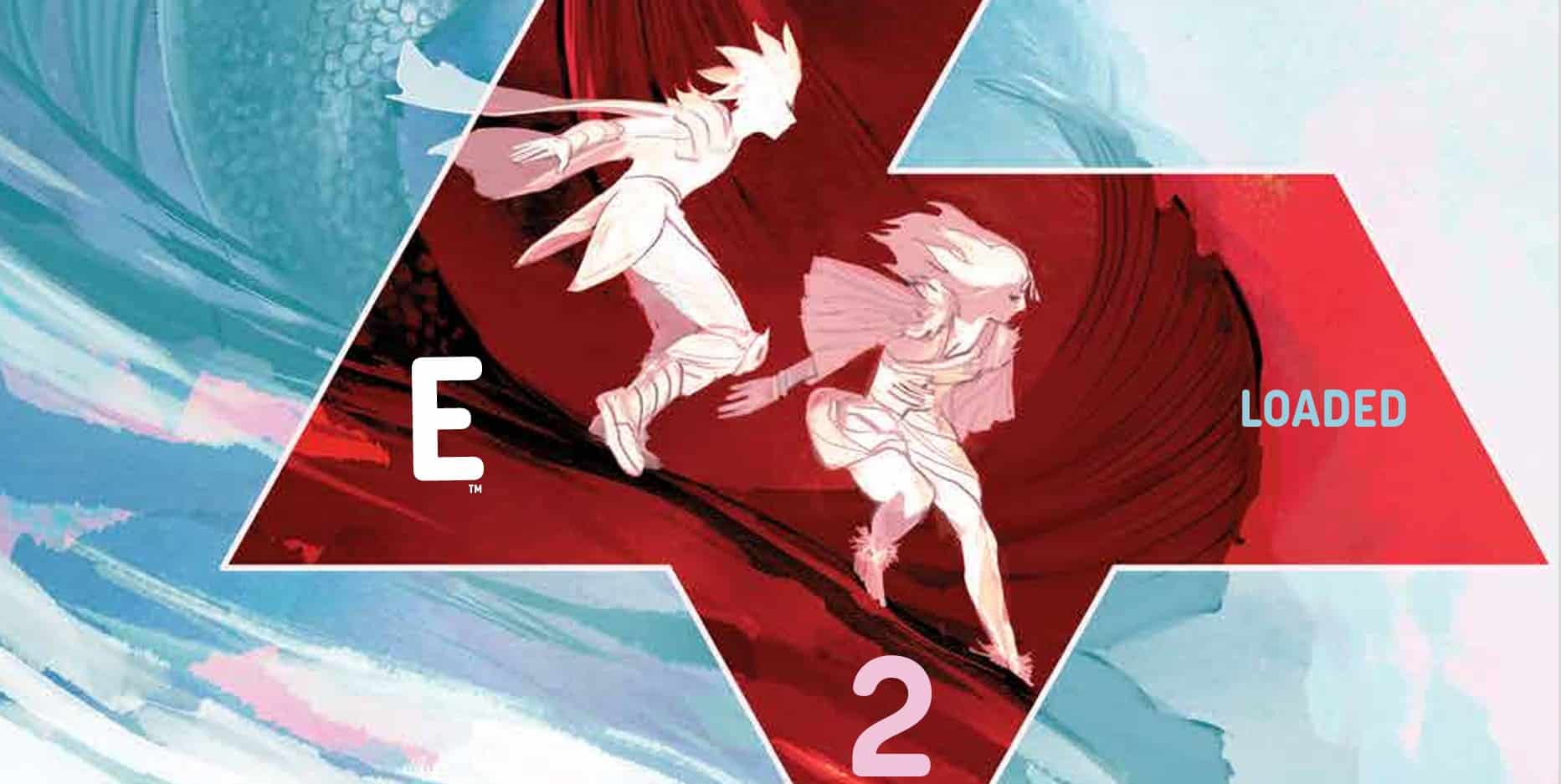Lona Steelrose wants to be a pro wrestler, but she’s living under the shadow of her mother, the best to ever do it. Everything changes when a wrestling-obsessed necromancer asks her to join the grandest pro wrestling tournament of all time, which is also the most dangerous. It’s The Wrestler meets Dragonball Z in a tale where the competitors get more than they ever bargained for in Do a Powerbomb #1, written and drawn by Daniel Warren Johnson, colored by Mike Spicer and lettered by Rus Wooton for Image Comics.
Ritesh: And here we are! A new Daniel Warren Johnson comic! And a pro wrestling comic at that!
I’ve been really looking forward to this one, especially as someone who’s been very lightly dipping their toes into wrestling over the past few years myself. Particularly due to having a number of lovely friends who are all die-hard wrestling fans, and do always tell me about the glory and thunderous power of the stories and skill in New Japan Pro-Wrestling.
Vishal: As one of those friends, I’ve also been really looking forward to this one. DWJ’s been unsubtly sneaking wrestling references into all his comics, and his art style makes for really dynamic action that makes for really good illustrations of pro wrestling. So at long last, we get a creator-owned comic that’s really just a love letter to this medium that’s lasted for so long.
Legacy
Ritesh: As a big lover of sports stories in general, particularly sports manga, I am fairly used to legacy stories. The massive shadow that haunts, the figure whose history both defines and delineates our hero, the tension and conflicts that emerge from that, it’s good stuff! It’s a genre classic, and it’s also a staple of wrestling. So I was really glad to see it open with that.
Vishal: Yeah, legacy is a MAJOR part of modern wrestling. It’s a lot like what if superheroes were actively forced to age up and retire and their children took up their mantles. Wrestling families are inherent to the medium, with major figures like Dusty Rhodes having their children follow in their footsteps and the McMahon family running the biggest wrestling company in the world for decades.
DWJ did a really good job selling the monumental stature of a pro wrestler at the top of their game with Yua Steelrose. She just feels larger than life, like a superhero. Especially to her daughter, through whose eyes we view this entire issue. Just from the first few pages you know that Lona Steelrose is going to follow in her mother’s footsteps. How could she not?
Ritesh: We’ve seen it in the recent Kill a Man and the modern sports classic that inspired it, Creed. The loss of a parental figure, their absence and the void it creates and how a person connects to their lost parent and tries to find their path. It’s just one of those juicy things you can mine endlessly for emotion and dramatic power. The parent-children dynamics are such universal things.
What I really loved a bunch though was the sort of “family” around the wrestler here. The sort of “backstage” and “behind-the-scenes” bits there, which communicated the sense of atmosphere and place. That’s one thing I really appreciated throughout this book. It’s loaded with that sense, from the crowds and locale and how DWJ presents it. It feels like a rather faithful attempt to translate the energy and mood of a wrestling arena and all that comes with it onto the page.
Vishal: Yeah, wrestling is an artform that relies not just on individuals but on the trust between every single person both in the ring and backstage. There can be plenty of interpersonal drama, plenty of legitimate hatred between two performers, but underneath all of that they need to trust that they have each other’s safety in mind at every point. This extends to referees, backstage personnel, everyone involved. Trust in your comrades, that when the bell rings everyone will do the best job they possibly can.
And you can see, in real life, how children who grow up with parents in the industry want to be a part of it. They see these bonds between people, this trust that the people they idolize have in their coworkers. Wrestling is often a nasty, painful business, but in the eyes of a child, this would be an aspirational future. This is why Cody Rhodes had a big part in creating a new wrestling company to rival WWE after he was treated horribly there. It’s also why he returned to the WWE as soon as the opportunity presented itself.
Ritesh: I love the way the comic steeps you in that context and headspace. You feel the adoration of the crowd, of the people who live and die by wrestling. You understand why a child raised in that environment watching their parent perform would hold them in impossible awe. The “performance” aspect in particular is fun, as the above panel lays out.
The way Yua performs, with eyes closed, looking down, and then raises her hand up to the crowd, it all feels like a textual translation of a great talking-to-the-crowd bit that is so definitively Wrestling.
And I just want to note, I’ve always been a Rus Wooton lettering mark, he’s done some of my favorite shit, and I continue to adore it here. He helps set the ambience of the locacle with all the lovely SFX touches and the great chants and screaming in the arena.
Performance
Vishal: Wooton’s lettering is really fantastic — his renditions of the crowd noise, of the cheers for Yua and the boos for Cobrasun, everything fits so well with Johnson’s art. And Johnson’s art conveys the energy and kineticism of pro wrestling so well. Even from the promos at the start — Yua is pure babyface, and Cobrasun is such a good heel. Johnson’s even pulling from current wrestlers — Cobrasun’s command to cut his music is directly reminiscent of AEW’s MJF, maybe the best heel in all of wrestling today. Their disagreement is a simple clash of values, but in a wrestling ring it feels like more than that — it’s a feud. If I were to criticize anything it’s that the writing of the promos was fairly weak, but honestly that’s on par for most modern wrestling. Charisma and delivery matter a lot more than content.
Ritesh: Yeah. That said, I do love Cobrasun’s design. He’s such a fun character. I appreciated that even in that horrifying scene where Yua falls, you see his very genuine horror and pain. When he whispers “No!” and you see those eyes, you know he means it. And then you see him after, and the regret and terror of what’s occured is all over his face. He’s distraught. It’s the moment where the kayfabe comes off. Some things are too real, like those unfortunate accidents, which I know have a long history in wrestling.
Vishal: Yeah, botches are an unfortunate but prevalent part of wrestling to this day. Most of the time they’re innocuous, just mistimed moves that look bad rather than hurt anyone. But there’s no shortage of legitimately horrible botches that have shortened or even ended careers. “Stone Cold” Steve Austin famously fell victim to a botch by Owen Hart that caused him a permanent neck injury that forced him to change his wrestling style and eventually retire in his prime. Very unfortunately, fatal botches are not unheard of either. This one is especially horrifying, a gruesome fall in the middle of a majorly publicized main event title match. It’s heartbreaking to watch this through Lona’s eyes.
Ritesh: Absolutely. It’s a devastating, unfair, cruel thing. Which also sets up the overall premise of the book after, when we cut to Lona as an adult and aspiring wrestler on poor terms with her family, wherein she gets offered a strange supernatural deal that might help her undo the greatest unfair tragedy of her life. She might get to bring her mum back to life!
I’m so curious to see how this book, which largely feels so authentic and real to the wrestling world, and leans on its delicate balance of the constructed and the real, ultimately fares when injected with that wild dose of the unreal. We’ve got a weird Satanic figure offering a Faustian bargain for Lona over here, all of which is going to require her wrestling to victory. It feels reminiscent to me in its basic construction of DWJ’s prior Murder Falcon in how it’s using genre setups to talk about loss in a big, bombastic action context. But it’s also quite different given the nature of what it is, by being about wrestling and mother-daughter relationships rather than music, health and death.
Grief
Vishal: Yeah, now we’re getting to the thrust of the book, which is an exploration of grief — mainly filial grief, as Lona tries to grow to be her mother, but we get a look at how her family, who were adults when the accident happened, are reacting as well. It’s a little tragic — Lona doing everything in her power to live up to the larger-than-life shadow her mother cast, while her father does everything in his power to not lose his daughter like he lost his wife. But this is a sports comic, so that won’t stop Lona from chasing her dream.
Ritesh: She’s absolutely going to take that deal and fight. The only question is:
Fight who exactly? Who awaits in this hellish arena for her? What manner of opponents will our young babyface have to wrestle with?
I guess we’ll find out.







